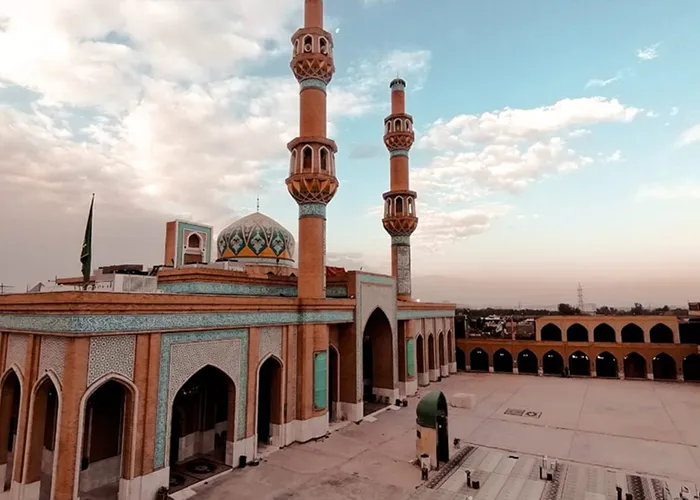Religious-Inquiries – Volume02 Issue20
Comparative Fiqh on Mosques: A Look at the Rulings of Imam Khamenei, Ayatollah Sistani, and Ayatollah Makarem Shirazi
Mosques (masājid) occupy a central role in Islamic life as sacred spaces dedicated to worship, reflection, and community cohesion. Within Shia jurisprudence, many detailed rulings govern how mosques are to be treated, maintained, and used. This article presents a comparative overview of the positions held by three of the most prominent contemporary Shia scholars: Imam Sayyid Ali Khamenei, Ayatollah Sayyid Ali Sistani, and Ayatollah Naser Makarem Shirazi.
1. Sanctity and Purity of the Mosque
All three scholars strongly emphasise the inviolable sanctity of the mosque:
- Imam Khamenei considers any act that violates the dignity of the mosque—such as music, inappropriate construction, or misuse of endowments—as forbidden.
- Ayatollah Sistani rules it haram to make any part of the interior of a mosque impure. The obligation to purify such impurity is immediate, and even the external walls must be purified if impurity leads to disrespect.
- Ayatollah Makarem Shirazi echoes these views, stating that even if a mosque is usurped and no longer recognisable, it must not be made impure, as a matter of obligatory precaution.
All three stress that the duty to purify a mosque is a communal obligation (wājib kifā’ī).
2. Construction, Repair, and Demolition
- Imam Khamenei permits voluntary repair of mosques without requiring permission from a marja‘, but forbids construction that alters the structure, such as building rooms in prayer areas. Demolition is only allowed in cases of overwhelming necessity.
- Ayatollah Sistani allows complete demolition only if renovation is impossible or to meet a clear communal need.
- Ayatollah Makarem allows demolition for rebuilding if the mosque is no longer usable or needs expansion. He prohibits the sale of mosque parts unless they can no longer be used in any mosque, and even then, funds must go to mosque-related needs.
3. Non-Worship Activities
- Imam Khamenei permits educational classes, Qur’an study, and revolutionary songs, provided they do not disturb prayers or violate the dignity of the mosque. Music, even if halal, is forbidden if it contradicts the sanctity of the space.
- Ayatollah Sistani allows mourning ceremonies and serving tea during such gatherings as long as they don’t interfere with prayers.
- Ayatollah Makarem similarly allows mourning events and serving food, and permits temporary tents and black cloths during commemorations, provided the mosque is not harmed.
4. Use of Facilities and Resources
- Imam Khamenei allows the use of mosque water and utilities for community benefit if not restricted by the original endowment. Renting out non-prayer areas like basements is permissible if they are not part of the mosque’s endowment.
- Ayatollah Sistani holds that carpets and fittings that become impure must be washed or replaced. Even ruined mosques retain their sanctity.
- Ayatollah Makarem insists on maintaining the original function of all mosque materials. If mosque materials are sold, proceeds must be used solely for mosque repairs.
5. Adab and Conduct in the Mosque
- All three scholars discourage worldly talk, loud voices, and sleeping in mosques unless necessary.
- Imam Khamenei allows serving food and educational activities as long as they respect the mosque’s sanctity.
- Ayatollah Sistani recommends entering with the right foot, wearing clean clothes, and using perfume. He advises offering a two-rakʿah greeting prayer upon entry.
- Ayatollah Makarem adds that even disliked smells (e.g., garlic breath) should be avoided.
6. Access and Usage Rights
- Imam Khamenei permits all Muslims to use any mosque, regardless of tribal or ethnic affiliations. He discourages non-Muslims from entering, especially if it dishonours the mosque.
- Ayatollah Sistani is silent on non-Muslim entry but affirms that ruined mosques retain their ruling until proven otherwise.
- Ayatollah Makarem shares this view and adds that children and the mentally unwell should not enter if they may cause disturbance—but encourages children to come if it fosters a love of prayer.
Conclusion
Across their various rulings, these marājiʿ uphold a shared vision of the mosque as a sanctified space central to the spiritual life of the Muslim community. While they differ slightly in application—particularly on permissible activities and construction—they are united in emphasising the mosque’s dignity, purity, and communal role. As custodians of these sacred spaces, we are called to uphold their sanctity with knowledge, reverence, and care.
editor's pick
news via inbox
Subscribe to the newsletter.




